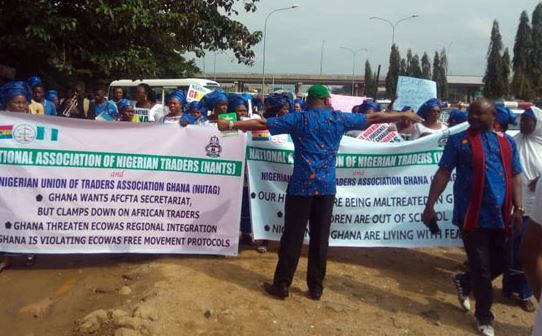Tanko Mohammed
President Muhammadu Buhari has again raised a delegation to find a solution to crisis between Nigerian traders and Ghanaian authorities after 40 business premises of Nigerians have been shut in addition to the 600 sealed.
The Nigerian traders, who have been embroiled in the crisis, accused Ghana of discrimination and confiscation of businesses.
The latest delegation, led by the Minister of Industry, Trade and Investment, Mr Niyi Adebayo, would be a second high-profile move to resolve the crisis which had persisted since 2019 when Ghana implemented the 2013 new trade policy for foreigners.
The first peace talk was led by Minister of Foreign Affairs, Mr Geoffrey Onyeama, in August 2020, when he met with representatives of the Nigerian traders in Ghana under the auspices of the Progressive Ambassadors of Nigeria, PAN as well as Ghanaian High Commissioner.
At the end of the talks, Onyeama warned that Nigeria would retaliate what he described as the mistreatment of the traders in Ghana and that threatened to seek redress at Community Court of Justice of the Economic Community of West African States (ECOWAS).
Referring to what he described as breach of ECOWAS protocol, he said: “What is the point of having an economic community if at the end of the day each country would make laws and regulations in contradiction of the protocol of the bloc?’’
“We are looking into the policy of reciprocity. Nigeria created an enabling environment for Ghanaians to operate in Nigeria and so, Nigerians should enjoy the same privilege in Ghana,’’ he said.
Nigerian traders have been kicking against Ghana’s implementation of “Ghana Investment Promotion Centre Act 865 of 2013’’, which reserved certain enterprises for Ghanaians and raised the stakes that foreigners must have minimum capital of $1 million before venturing into any business.
The Act states that such businesses owned by foreigners must also hire at a minimum of 25 skilled Ghanaians, an order that every company must meet.
Mr Nnaji Nwachukwu, President of a Nigerian traders Union in Ghana, said, the new law prohibits foreigners from “sale of goods or provision of services in a market, petty trading or hawking or selling of goods in a stall at any place; the operation of taxi or car hire service in an enterprise that has a fleet of less than twenty-five vehicles; and the operation of a beauty salon or a barber shop’’.
He said: “Most of our members do not have the required $1 million cash or equity.”
Nigeria’s Ministerial delegation to Ghana which was constituted on May 10, 2021, is to engage in further dialogue with Ghanaian authorities between May 31 and June 1, 2021.
The delegation would remind Ghana to thread softly being the host of the Secretariat of the African Continental Free Trade Area (AfCFTA), a new body that entrenches free movement of persons and trade among member states.
Ghana has defended its decision through the Public Relations Officer of Ministry of Trade and Industry, Mr Prince Boateng, who said: “It’s not a fight against Nigerians”.
“The law provides that a person who is not a citizen may engage in a trading enterprise if that person invests in the enterprise, not less than $1 million in cash or goods and services relevant to the investments’’.
“We are ensuring that all foreigners in retail do the right thing. But we will not stop the enforcement of our laws just because Nigerians are the majority of those affected by the crackdown.”
Trade relations between the two economic giants of West Africa in recent years, are strained, with the actions and reactions from both sides drawing them further away from cooperation.
Nigeria and Ghana have recently adopted policies of nationalism and protectionism and protecting people and property against foreign competition, Prof Abdullahi Ahmed, an Economist, reported.
The policy led Nigeria to close its land borders in August 2019, hoping to stop influx of foreign goods which Nigeria has comparative advantage. The borders were reopened in December but placed more than 42 goods in import restriction list.
Tensions have been high between the two countries since Nigeria partially closed its borders with Cameroon, Benin and Niger.
Irked by Nigeria’s action, the Ghana Union of Traders Association (GUTA) instructed the closure of some Nigerian-owned shops, with an explanation that
“If Nigerian authorities are saying Nigeria first, Ghanaian authorities should also say Ghana first.”
In spite of the squabbles, the trade between the English speaking nations expanded, hitting more than $2.6 billion, much of which is in the informal sector.




